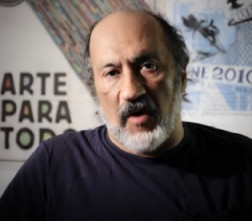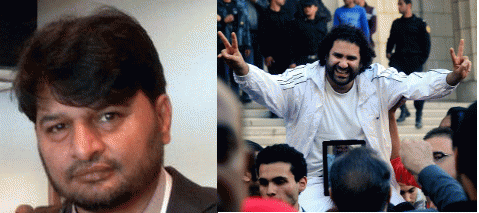As bad as things get for our movement in this country, we are not yet feeling the full throttle of repression and, if one needs a reminder of that and perhaps a profile of what's in store for us if we don't organize now, the situation facing Internet activists in the Middle East provides it.
Three weeks ago, June 11, Egyptian blogger and on-line activist Alaa Abdel Fattah was sentenced to 15 years in jail by an Egyptian court. His crime? He was part of a November 26, 2013, peaceful demonstration in front of the Egyptian Shura council protesting a proposed constitutional provision allowing military trials for civilians. His trial was held at a police station and he and 23 other defendants in his case weren't allowed to be present. They were all sentenced in absentia as they stood outside the courtroom.
Fattah is one of the world's best-known Internet activists; he's given interviews to so many countries he's like a United Nations of sound-bites. That makes even more brazen the farcical trial and nightmarish sentence handed down. It also makes clear how far governments will go in implementing the blueprint for Internet repression that is being followed, in one way or the other, world-wide.
About a week later, Pakistan's chapter of Bytes for All (among the most acclaimed Internet-rights organizations in the world) released a remarkable study about hate speech in Pakistan. The study is among the most informative ever on this topic and that's an enormous contribution. But its most important finding is that hate speech isn't some random rant by a fool or a crazy person; it is political, organized, and a motor of repression.
Perhaps the greatest lesson is that the study was publicized at all. Bytes for All (Pakistan) operates under relentless attack and repression. Its coordinator, Shazhad Ahmad, has been sentenced to death (the sentence deferred) and can't live with his family for security reasons. Its staff is constantly harassed and some staff members have been arrested and one was beaten fiercely outside the organization's office.
This is about how much worse repression can get and how it is being facilitated. But it's also about how, despite the conditions, brave people keep fighting and should be supported.
The Bytes for All report is couched in the careful and fact-laden language of NGO activism to present a treasure trove of facts, cases and quotes while making the case that all this is politically driven. Page after page of the report describes cases in which on-line and other public-communications systems have been used to repress movements, deepen the oppression of women, and target (sometimes successfully) opposition leaders for beatings or death.
But it also reveals an important fact about the government response to political and social crises: regimes are now using mass expression to oil their repression and to build extremist right-wing movements to protect them. The hysterical leaflets and screaming speeches that were once the mobilizing cry of fascism have been replaced by hateful statements floating on the pixels dancing across computer screens. There's something incremental about these "one at a time" rants. With each Facebook entry or tweet on Twitter, the hysterics of hate deepen and become more violent: shooting vituperative volleys like spraying bullets, the calibre increasing with each post.
The 63-page report was written by Pakistani journalist Jahanzaib Haque, who writes for the popular Pakistani publication Dawn.com (among others), and was based on an online survey on hate speech to which 559 Pakistani Internet users responded. This was complemented with monitoring and information-gathering from "high impact, high reach" Facebook pages and Twitter accounts.
According to the report, 92 percent of all respondents have come across hate speech online and over half (51 percent) have been the target. Of those targeted people, 42 percent said they were targeted for their religious beliefs, 23 percent for their nationality, 22 percent based on race/ethnicity, and 16 percent for sex/gender/sexual orientation.
"... the 30 Facebook pages analyzed (3,000 shares and related comments) contained 10,329 counts of hate speech, which translates to more than three counts of hate speech on every single share," the report's findings synopsis says.
It's disturbing but not surprising. This is after all the country where Malala Yousafzai, the 12-year-old student who advocated for education for women, was shot point-blank in the face by a Taliban thug as she was riding home on a school bus. Her case provoked international reaction as she slowly recovered from her wounds outside her country and a promise by the Taliban, which admitted planning her murder, to finish the job if she ever returned. The shooting was the culmination of a remarkably virulent attack campaign on Facebook.
Pakistan is the place where on-line hate speech has fanned sectarian flames morphing into murderous mobs like those in Rawalpini in 2013 (where Muslim and Sikhs engaged in a community-based war leaving scores dead). It's a country where a charge of blasphemy, supported by hundreds of twitter or Facebook messages, can end in a death sentence or imprisonment. It's the place where media personalities, journalists, and even actors can see their lives endangered and careers ruined by an on-line hate campaign.
It's also, not unconnected, a country that has been bombed, attacked, invaded, violated, bullied and villified by the United States government: treatment that appears to have fed the right-wing ferocity documented in this report.
The Pakistani government's reaction to all this is dramatized by the fact that it goes on uninterrupted while the regime continues through threat, intimidation, beatings, arrests, and even a recent tax case to shut Bytes for All down. The target isn't the crime; it's the crime's opponent.
(Note: You can view every article as one long page if you sign up as an Advocate Member, or higher).






